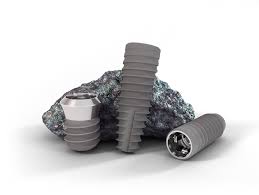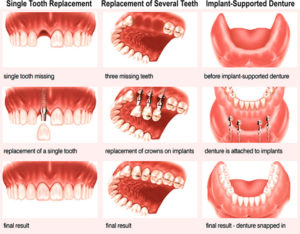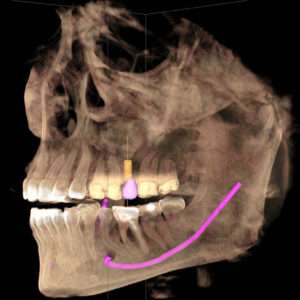B & F Dental Clinic – Patient Information Series
All About Dental Implants In Singapore
Why Choose
B & F Dental Clinic for your Dental Implant Treatment?
- Meticulous and experienced dental surgeons whom have worked with many satisfied clients.
- We focus on achieving the best surgical results with least discomfort for our patients.
- Recommendations only given in your best interests.
- Fully equipped with 3D Digital X-ray.
- Excellent hygiene and sterilization protocols for cleanliness.
- Appropriate medications for pain control prescribed for your comfort.
- Medisave-Accredited – Surgery claimable as per government guidelines.
- Subsidies for Pioneer Generation, Merdeka Generation and CHAS available for extractions.
- Medical leave given as required for your rest and recuperation.
- Contact us today at +65 6909 7664 or WhatsApp +65 9383 6121.
What are Dental Implants?

Dental Implants are small metal screws fixed into the jaw. Each screw is called a fixture. These fixtures are made of titanium metal with a layer of titanium oxide on the surface. The surface layer of the implant is engineered to allow human bone to grow around it, securing it in place within the jaw.
Of course, nobody wants a metal screw within their jaw for no reason right? The implant fixture is meant to support a metal component on top called the abutment, and the abutment in turn supports the prosthesis.
The prosthesis is the part that looks like a tooth / teeth within the mouth, and allows you to bite and chew with.
A Dental Implant Does Not Replace A Missing Tooth!
It is A Metal Screw That holds An Implant-Crown that replaces a missing tooth.

How Do I Know I'm Suitable For Dental Implants?
People who are not suitable for implants include those who are too frail for surgery or those who have complex medical problems.
We can do dental implants for people with adequate bone and whom are generally in good health.
Those with active gum disease may need to have the gum disease treated first before they have implants done, as the bacteria can affect the implant as well.
It is known that people who smoke and people who have poorly controlled chronic diabetes usually do not heal as well as healthy people.
It does not mean that you cannot do implants if you smoke or you are diabetic, but we may have to proceed with extra precautions and recommend that your medical doctor manages you first if needed.
Am I Too Old For Implants?
Health is more important than age. We have patients in their sixties and seventies who do implants because they want to look good and chew better in their silver years.
It is not unheard-of for those in their eighties to do implants. More importantly, you must be able to lie back comfortably and keep your mouth open for some time.

Do Implant-Crowns Feel Like Real Teeth?
Implant crowns generally look and feel like real teeth in the mouth, with the following small differences.
Implant crowns are attached to the bone directly while real teeth are attached to the bone by ligament fibres.
These fibres have nerve endings that allow us to better feel touch and pressure.
An implant-supported crown will not be able to distinguish touch and biting force as well as a real tooth.
Why Dental Implants? Can I Choose Something Else?
Dental implants are not the only way to replace missing teeth. They also have their pros and cons. In B & F Dental, we always offer you alternative options such as bridges or dentures and it really depends on what you want, what your health and jaw condition allows you to do and your budget.
Do you have good bone? Do you prefer not to have something removable in the mouth? Do you want to be able to floss it like a normal tooth? An implant is generally one of the best options we have today for replacing a single missing tooth.
What If I have Many Missing Teeth?
Implant crowns generally look and feel like real teeth in the mouth, with the following small differences.
Implant crowns are attached to the bone directly while real teeth are attached to the bone by fibres.
These fibres have nerve endings that allow us to better feel touch and pressure.
An implant-supported crown will not be able to distinguish touch and biting force as well as a real tooth.
What If I Have Many Missing Teeth?
No teeth? No problem!
If your jawbone allows, dental implants can be used to restore anything from a single missing tooth to 28 missing teeth or more.
For a single tooth, this will normally be an Implant-Supported Dental Crown. For multiple teeth, we would normally do an Implant-Supported Dental Bridge or an Implant-Supported Removable Denture.

Are Dental Implants A New Thing?

Not really. Dental implants have been around for longer than many people today.
Dental implant technology has been heavily researched since the 1960s and has undergone many changes to the form it takes today, which is a root-form implant that resembles a single-rooted tooth.
There are many different types and brands of implants from all over the world, and they have many different parts and components. All of them use some form of titanium, but the quality, grade of titanium and parts can vary a lot between brands, hence the different pricing.
Most of the systems work in a similar fashion and are able to work well if used correctly.
In recent years, European and Korean implant systems have become more popular in Singapore. Here in B & F Dental, we carry both a Swiss Implant System and a Korean Implant System to suit your needs and budget.
Are Dental Implants Safe?
Dental Implants are very safe when used correctly. Of course, our face and jaw do have some critical structures such as blood vessels, neighboring tooth roots and nerves which we dentists do need to take due care of to avoid when placing the implant.
Here in B & F Dental, we would normally first screen you with a 2D Dental Panoramic X-ray.
If we feel it is of benefit to you, we would proceed with a 3D Cone-Bean Computerised Tomography (CBCT) scan which will render your jawbone and teeth in 3D on our PC. That would allow us to check the available implant space in 3D to see if you are suitable for an implant before doing any surgery.

This is an example of a 3D CBCT scan, which we are equipped with in our clinic. The scan allows us to map out the position of critical structures such as your maxillary sinuses, which are air-filled spaces above the upper jaw, or the inferior dental nerve, which runs along the lower jaw.
Why is this important? It is important to know as if the bone is too thin beneath the maxillary sinus, you may not be able to place an implant there without additional procedures such as sinus grafting or bone grafting. For the lower jaw, we need to ensure that our implant is generally 2-3 mm away from the nerve canal to avoid disturbance to the lower nerve.
This planning will be done by our dental surgeons and we will advise you if you are not suitable for the procedure, or if any other procedures such as bone grafting or soft tissue grafting need to be done before implant placement.
How Long Do Dental Implants Last?
The success of dental implants depends on many factors, such as your health and bone condition, your oral hygiene, the positioning of the implants, whether the prosthesis done is cleansable etc.
The common answer given is that implant survival after 10 years is around 90%, which is generally quite good.
In our experience at B & F Dental, implants can last well for a very long time – even decades.
The common problems with implants over time are often: 1. Loss of gum support, 2. Gum infection, 3. Difficult-to-clean implant crowns and prostheses resulting in poor hygiene.
We would urge patients to return for regular checks and cleaning. That allows us to spot problems early, and reduce the chances of problems around your implants.
How Are Dental Implants Placed?
The success of dental implants depends on many factors, such as your health and bone condition, your oral hygiene, the positioning of the implants, whether the prosthesis done is cleansable etc.
The common answer given is that implant survival after 10 years is around 90%, which is generally quite good.
In our experience at B & F Dental, implants can last well for a very long time – even decades.
The common problems with implants over time are often:
1. Loss of gum support
2. Gum infection
3. Difficult-to-clean implant crowns and prostheses resulting in poor hygiene.
We would urge patients to return for regular checks and cleaning. That allows us to spot problems early, and reduce the chances of problems around your implants.
How Are Dental Implants Placed?
- In our clinic, we would first administer local anaesthesia to the implant area to ensure that the procedure is as painless as possible. If we feel it is useful to you, we would prescribe you painkillers to be taken before the procedure.
- Once your jaw is numbed up and we check that you do not feel any pain, we will proceed to make a small opening in the gums to expose the bone.
- We then use small drills to make a opening in the bone and place the implant into the bone. X-rays may be taken.
- We will then attach the healing cap (abutment) that shows through the gums. In some cases, we may attach a cover (cover screw) and leave the implant hidden under the gums. The gums are then closed together with very fine stitches that are thinner than a hair.
- You will be prescribed medication for pain control. We will also advise you on the appropriate aftercare. A 2-week appointment is normally given for a follow-up check and stitch removal, which is normally a very quick procedure with no injection required.
- Assuming all goes well, the next appointment after the stitch removal will be around 3 months from the implant surgery date.
- At this stage, if the implant was hidden under the gums, we would do a second-stage uncovery to expose the implant and fix on the healing cap. This is normally a quick procedure under anaesthesia. The next appointment would be about 2 or more weeks later.
- If the healing cap is already placed, we would take an impression of your teeth and gums to make your final dental prosthesis. You will then go home with the same healing cap.
- Once the prosthesis is ready which normally takes about 2 weeks or less, you will come back to insert the final crown.
How Long Do I Wait Before I Get My Implant Tooth?
- Simple Implant with good bone and no complications: 3.5 months on Average.
- Complex Implant with additional grafting procedures required: 4 to 12 months on Average
How Much Downtime Should I Expect?
You may generally be a bit sore on the day of the surgery. We will give medical leave for you to rest for a few days if required. Most people are able to function perfectly well after the surgery in terms of eating, talking and doing office work.
Be careful to avoid exertion / active sports for the few days after the surgery as we do not want you to tear open the surgical area. We would advise that you eat soft foods and rest at home.
You should have minimal to no downtime during the 3 months of implant healing if everything goes well.
Less Haste, More Speed. Don't Rush. Let Us Do An Ideal Job For You.
If you fracture your arm, can the orthopaedic surgeon heal it in a week? No, they put a plaster cast for weeks to months!
It’s not that we dentists want to delay your treatment. In fact, we would like to deliver the tooth to you as efficiently as possible. However, for implant surgeries we are limited by your body’s healing ability.
Studies have shown that it takes on average 3 months for bone to grow and solidify well around the implant screw, before the screw is stable enough to support a tooth on top.
While there are cases where we can do this ,if we place something on top immediately, the biting and chewing forces may constantly hinder bone healing and the solid dense bone that we want will not form. In fact, the implant may become surrounded by a fibrous soft tissue.
In that case, it will need to be removed and re-done. That would set your treatment back by months.
Less Haste, More Speed. Don't Rush.
Let Us Do An Ideal Job For You.
There are always exceptions to the rule for certain suitable cases. In general, it takes time for us to deliver you a good implant.
I Did An Implant Elsewhere but It's Loose. Can You Help Me?

Managing dental implants done elsewhere or in other countries can be tricky as we need to first identify the implant, source if the replacement parts are available and check if we have the correct tools to manage your implant.
B & F Dental is equipped with the tools to manage most implant systems.
It is a great help to us if you can find out from your previous dentist which implant system was used, including the implant model and size. We will need to take x-rays of your implant.
As for whether the implant parts can be replaced, leave that to us. However, take note that this may be difficult for smaller brands which may no longer be operational as we have seen implants that have been placed many many years ago.
Should all else fail and the implant is defective or problematic, we can remove the implant for you and replace it with another one if appropriate.
Implants are Excellent Tooth Replacement Options For Many People.
Speak to us if you would like to consider dental implants for yourself.
